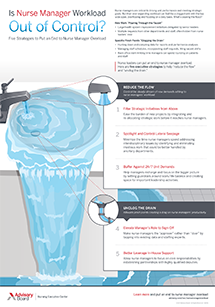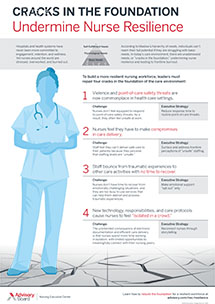Auto logout in seconds.
Continue LogoutIn a viral social media post, Andrea Pellerin, a registered nurse at Covenant HealthCare in Michigan, described the most "heartbreaking" and distressing aspects of being a nurse, the Daily Mail reports.
Infographic: The 4 foundational cracks that are undermining your nurses’ resilience
Pellerin, 28, first shared the post on Tumblr last year, but the post went viral when Kayla Thomas, a nurse at Marion Surgical Management, shared Pellerin's post to Facebook. Since then, the post has been shared over 300,000 times and has garnered more than 76,000 comments.
The hardest part about being a nurse
In the post, Pellerin writes that, while cleaning up vomit and feces may sound difficult for people with a "weak stomach," handling bodily fluids won't be what "turns your stomach" if you become a nurse. In fact, most nurses "come to accept it's just part of the job," she writes.
Rather, what affects nurses most are the moments of fear, anxiety, and distress they share with their sick patients, Pellerin writes.
"What will turn your stomach will be 40 shallow breaths a minute in a patient in respiratory distress," Pellerin writes, or "[a] freshly born infant that is limp and blue and hasn't cried yet."
Pellerin recalls a time when she detected "tripled troponin levels" on a "sweating and anxious patient" who was having a heart attack. And she'll never forget "feeling a cord during a cervical check, then trying to hide from your patient the shaking in your voice as you call for help."
Further, Pellerin writes, she's had to witness "[t]he pale skin of a Jehovah's Witness with a hemoglobin of 4 as she declines a blood transfusion and says goodbye to her family because … she's running out of time," and a woman in the ICU "signing her DNR while her sobbing daughter beg[ged] her to reconsider, knowing that if treatment is stopped, then her mother will die."
Compared to these moments, cleaning up blood, urine, and feces is not especially difficult, Pellerin writes. "In the face of everything else that comes with being a nurse, I promise you'll get used to the poop."
Pellerin's 'heartbreaking' post goes viral
The 76,000 comments on Pellerin's post revealed that her words hit home for a lot of current and former nurses.
One user in a Facebook comment said nurses "get used to everything. And when you lose a [patient]. You remain professional. Then step out in the hall and cry. Gather yourself and take care of the living."
In response to the comment, another user wrote, "And we console each other. And we get back to work."
The post also resonated with patients and their families who commented their appreciation. "A nurse will never truly know how appreciated you are. … Kudos to you all," one user wrote (Donlon, DailyMail, 5/15).
The 4 foundational cracks that are undermining your nurses’ resilience
Check out our infographic to learn which four cracks in the care environment leaders must repair to rebuild the foundation for a resilient workforce.
Don't miss out on the latest Advisory Board insights
Create your free account to access 1 resource, including the latest research and webinars.
Want access without creating an account?
You have 1 free members-only resource remaining this month.
1 free members-only resources remaining
1 free members-only resources remaining
You've reached your limit of free insights
Become a member to access all of Advisory Board's resources, events, and experts
Never miss out on the latest innovative health care content tailored to you.
Benefits include:
You've reached your limit of free insights
Become a member to access all of Advisory Board's resources, events, and experts
Never miss out on the latest innovative health care content tailored to you.
Benefits include:
This content is available through your Curated Research partnership with Advisory Board. Click on ‘view this resource’ to read the full piece
Email ask@advisory.com to learn more
Click on ‘Become a Member’ to learn about the benefits of a Full-Access partnership with Advisory Board
Never miss out on the latest innovative health care content tailored to you.
Benefits Include:
This is for members only. Learn more.
Click on ‘Become a Member’ to learn about the benefits of a Full-Access partnership with Advisory Board
Never miss out on the latest innovative health care content tailored to you.


